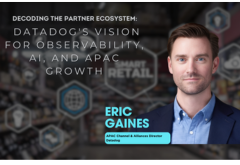The tech industry is increasingly becoming the biggest polluter in the world. As a result, many companies are adopting sustainable technologies and are working towards a cleaner planet, highlights Amit Luthra, MD – India, Lenovo ISG in a brief interaction with Amit Singh. The company believes in a holistic approach to sustainability, whereby they want to create a circular economy model, where they can get the best-in-class products and services from their suppliers, in turn helping them reduce their carbon footprint.
How is technology critical in addressing sustainability challenges and creating sustainable businesses?
Technology is the backbone of any tech-first business today. A strong IT infrastructure can help businesses minimize their carbon footprints by tracking and identifying carbon-related pain points along the entire supply chain. Additionally, products are designed using advanced servers thereby making the packaging environmentally friendly and reducing plastic waste & carbon emissions.
Where do we stand at innovations for sustainable technologies to meet the green demands of industries? Please talk about your innovations in sustainable technologies.
In Q3 FY 23,onthe 30th Anniversary celebration of the ThinkSystem server, Lenovo launched the fifth generation of Lenovo Neptune Direct Water-Cooling technology along with a range of sustainability services to help customers reach their sustainability goals. The technology helps industry-leading data centers with a broader range of servers that recycle loops of warm water to cool systems and enable customers to reduce power consumption by up to 40 percent. Along with fulfilling the ESG goals, savings on power consumption also helps businesses to save costs and extend the life of their infrastructure.
Additionally, Lenovo’s latest ThinkSystem SD650 V3 and SD650-I V3 servers extend Neptune cooling efficiency for High Bandwidth Memory (HBM) providing HPC applications up to four times more memory bandwidth and delivering up to 2.8 times generational performance improvement.
In this context, as-a-service models can greatly impact and improve the overutilization of infrastructure. Lenovo TruScale Sustainability services allow customers to pay as they goandsupport reduced energy consumption. Lenovo’s Asset Recovery Services for IT infrastructure allows IT reuse, recycling, and disposal and mitigates environmental and data security risks associated with end-of-life asset disposal.Lenovo also uses 30% ocean-bound plastic to build devices and servers along with an innovative packaging design that has saved over 3.5 million pounds of cardboard to date.
Our solutions are designed to last longer and consume less electricity tosupport our customers’ growing commitment to improvingtheir environmental, social, and governance (ESG) investment outcomes.
What are segments/industries which are leading the sustainable technology adoption in India?
Today, businesses across industriesare prioritizing their ESG responsibility and are looking for the right tech partners who can help accelerate these achievements. Industries that are leading sustainable technology adoption in India are the Data Center businesses, Packaging, Power & Energy, Agriculture, Healthcare, and Transportation. Businesses in these segments are increasingly using technology to reduce carbon emissions, better yield, plastic waste, as well as costs.
Please brief us on the use cases of sustainable technologies in India.
The era of green tech is on the rise, andLenovo is actively working towards our 2050 Net-Zero carbon emissions goal.We are committed to building a better future for our customers, communities, & planet and offerour range of sustainability services and technologies – Lenovo Neptune Direct Water-Cooling System and Lenovo Asset Recovery Services – to help customers reach their sustainability goals.
Lenovo encourages the shift to a circular economy, and we consistently innovate in the way we design and supply our products & services. For example, Asset Recovery Services designs products using advanced servers which are 100% recyclable and reduce marine plastic waste and carbon emissions. Whether it is Plastic Recycling, Liquid water-cooling systems, Solar Power Energy, or offset of CO2, we are collaborating with our customers, suppliers, and industry to identify circular opportunities in support of a more sustainable future.
 Latest Technology News Today – Get Latest Information Technology Updates and Services Latest Technology News Today – Get Latest Information Technology Updates and Services
Latest Technology News Today – Get Latest Information Technology Updates and Services Latest Technology News Today – Get Latest Information Technology Updates and Services 









